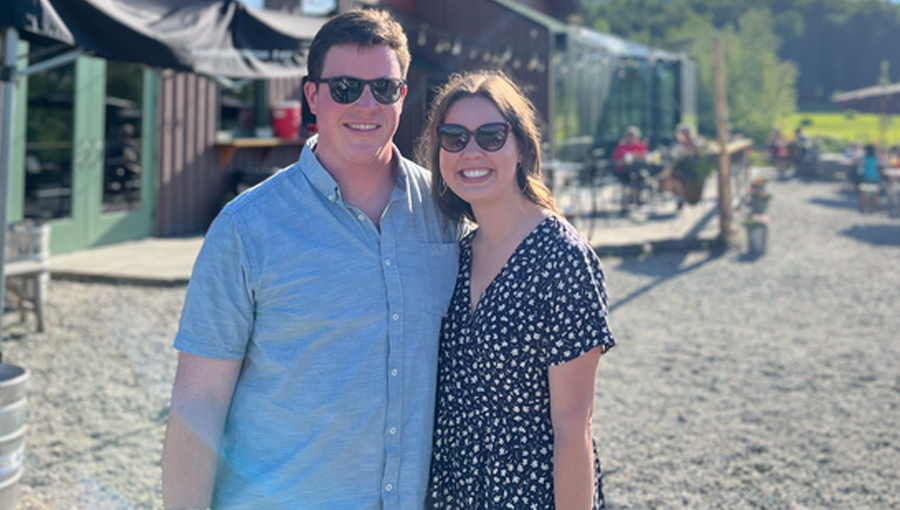How One Alumna Learned To See The Lord In All Things
By Kate Lucky, Harvard ’15
In college, I spent many mornings talking about stories: analyzing characters and structures and metaphors, voicing my ideas about plot and motif. At the end of these classes, we closed our novels and ventured out into the cold. I was an English concentrator.
Some afternoons, I spent time with another set of stories and epistles and histories, sitting in basements with other women eating kettle corn and slices of mango. Understanding the poems and parables and prophecies contained in this particular book had more ultimate stakes than a good grade. At the end of the study, we closed our Bibles and prayed. I was a Christian.

Kate Lucky, above right, with her husband Jared.
When I was at Harvard, these identities—lover of books, lover of God—felt entirely cohesive to me. I have Christian Union to thank for that. I can imagine how it might have been otherwise. But in weekly studies and worship nights, in conversations with ministry fellows and peers, I always felt that I could be a serious student of the Bible and a serious student of all of the other texts God had put into the world. In the assigned readings for my courses, I encountered questions—What is the good life? Are faith and reason incompatible? What is the nature of love? Why do we suffer?—that were addressed, lovingly, by the gospel, by the particular person of Jesus. This was a reassurance.
My time in HCFA (now CU Gloria) was defined by reading and thinking and drawing on the wisdom of teachers. But it was also defined by what happened outside of those exegetical contexts. Increasingly, I understood not only what it meant to read stories about God in history, but to live inside the ongoing story of God’s work in the world. This story did not always (at least from my vantage point!) go in predictable directions or feature compatible characters. Often, it meant making sacrifices.
Being in HCFA meant taking time away from essay writing and networking to purchase snacks for parties, rehearse hymn harmonies, and pray for someone’s chemistry test (again). It meant having difficult conversations, grappling with misunderstandings and hurts and doubts. It meant working through issues of lust and pride and greed—issues one would rather keep secret, now out in the open to be prayed over and held accountable for. It meant extending and receiving grace even when it didn’t feel deserved. Eventually, when I stepped into a leadership role, it meant putting into practice all of my abstract thinking about what it meant to have integrity as a Christian, to be not just a conventionally “good person” but a follower of Jesus.
I picked my roommates and dinner companions and professors and boyfriends. But I didn’t pick the people in HCFA. I didn’t pick my brothers and sisters in Christ: nor did they pick me. That was what made this story so compelling, so full of true-to-life struggle and triumph, and so, ultimately, rewarding and redemptive.
Being part of the HCFA community got me interested in writing about other communities of faith—understanding how their theology worked itself out in how they worshiped, how they ate, how they prayed, how they worked, how they negotiated difference, how they became parts of the body of Christ. My senior year, I set out to write a creative thesis on three congregations in Cambridge, a Quaker meeting, an Episcopal monastery, and a Pentecostal church. I loved working at the intersection of journalism and spiritual biography, meeting other believers from different traditions.
After graduation, I started an MFA in Nonfiction Writing at Columbia University, and got an internship with a small Catholic magazine called Commonwealth. Just over a year later, I started my career there as the publication’s first woman managing editor. These days, I’m the Senior Editor of Audience Engagement at Christianity Today. I’m also a freelance writer, currently at work on a collection of essays.
Since graduation, I’ve also been a member of three wonderful churches in the different places my husband and I have lived—Trinity Heights, Grace Community Church, and now, Holy Trinity Silicon Valley. These churches, two of them plants, have been wonderfully varied, with different styles of worship and different kinds of community formation and service: French movies in Central Park, barbeques on the Long Island Sound, prayer breakfasts in backyards filled with songbirds, book studies, foot washing, meals for the unhoused, baptisms in Manhattan bathtubs. These churches have come up against different challenges and celebrated different triumphs and ministered to many. What a gift it has been to be part of each one.
My time in HCFA helped prepare me concretely for my vocation as an editor and a writer and a reader. It also, perhaps more importantly, prepared me to be part of a community of believers. It instilled in me the value of the local church, of what God is doing here and now in the midst of things: even in college, even in your twenties, even when life is busy and hard and you’re tired. In a Quincy House basement. In a dining-hall conversation. In Friday-night worship. In a talk with a friend, walking through the snow.












